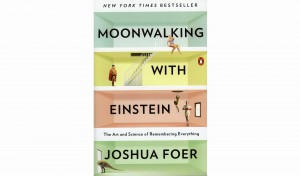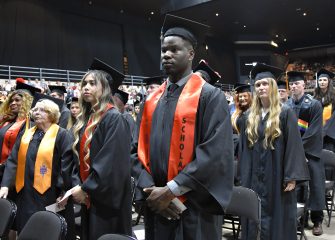
By Dr. Lawanda Dockins-Mills
Associate Dean of Students, Salisbury University
Can memory be improved? Joshua Foer thought so.
The 30-something Washington, D.C., native chronicled his yearlong quest for memory improvement in the international bestseller Moonwalking with Einstein: The Art and Science of Remembering Everything.
The nonfiction selection is this year’s New Student Reader book at Salisbury University.
Celebrating its 11th year this fall, the New Student Reader program is designed to introduce new students to the academic community by sharing a common reading experience with classmates, faculty, staff and upperclassmen who serve as orientation team peer leaders. Members of the greater community also are invited to join in the experience.
Foer’s book debuted at no. 3 on The New York Times bestseller list. In in, he tackles the subject of memory the way professional athletes approach sports: He trained for a year using cutting-edge research, cultural history and mentalist tricks before entering the “big leagues,” becoming a finalist in the U.S.A. Memory Championships. Along the
way, he helps transform the way many people think about human memory.
The New York Times called the images Foer uses as memory tools “riotous.” The Guardian of England hailed Walking with Einstein as “a delightful book.” Microsoft founder Bill Gates called it “absolutely phenomenal.”
A public discussion and book signing with Foer is 7 p.m. Thursday, August 27, in Perdue Hall’s Bennett Family Auditorium. Admission is free and the public is invited. Those planning to attend are encouraged to read the book in advance.
The next day, the author meets with new students at SU and keynotes the University’s annual Fall Convocation, traditionally the first on-campus academic experience for incoming freshmen. Admission to Convocation is by invitation only.
Moonwalking with Einstein has been published in 33 languages. In a TED Talk on “Feats of Memory Anyone Can Do,” Foer said: “Once upon a time this idea of having a trained, disciplined, cultivated memory was not nearly so alien as it would seem to us to be today. …People invested in their memories, in laboriously furnishing their minds. Over the last few millenniums we’ve invented a series of technologies … that have made it progressively easier and easier for us
to externalize our memories; for us to essentially outsource this fundamental human capacity.”
He argues that such technologies have changed us culturally and cognitively: “Having little need to remember anymore, it sometimes seems that we’ve forgotten how.”
Foer’s work has appeared in The New Yorker, National Geographic, Esquire and Slate, among others. He is the co-founder of Atlas Obscura, an online guide to the world’s wonders and curiosities.
Through the New Student Reader Program, SU has been pleased not only to broaden the world of thousands of students, but to invite the community to take part in this academic experience, as well.
Other recent New Student Reader selections have included The Immortal Life of Henrietta Lacks by Rebecca Skloot; The Meaning of Matthew: My Son’s Murder in Laramie, and a World Transformed by Judy Shepard; and Picking Cotton: Our Memoir of Injustice and Redemption by Ronald Cotton and Erin Torneo.
We look forward to continuing to share the joy of reading and learning as the program continues in its second decade.






